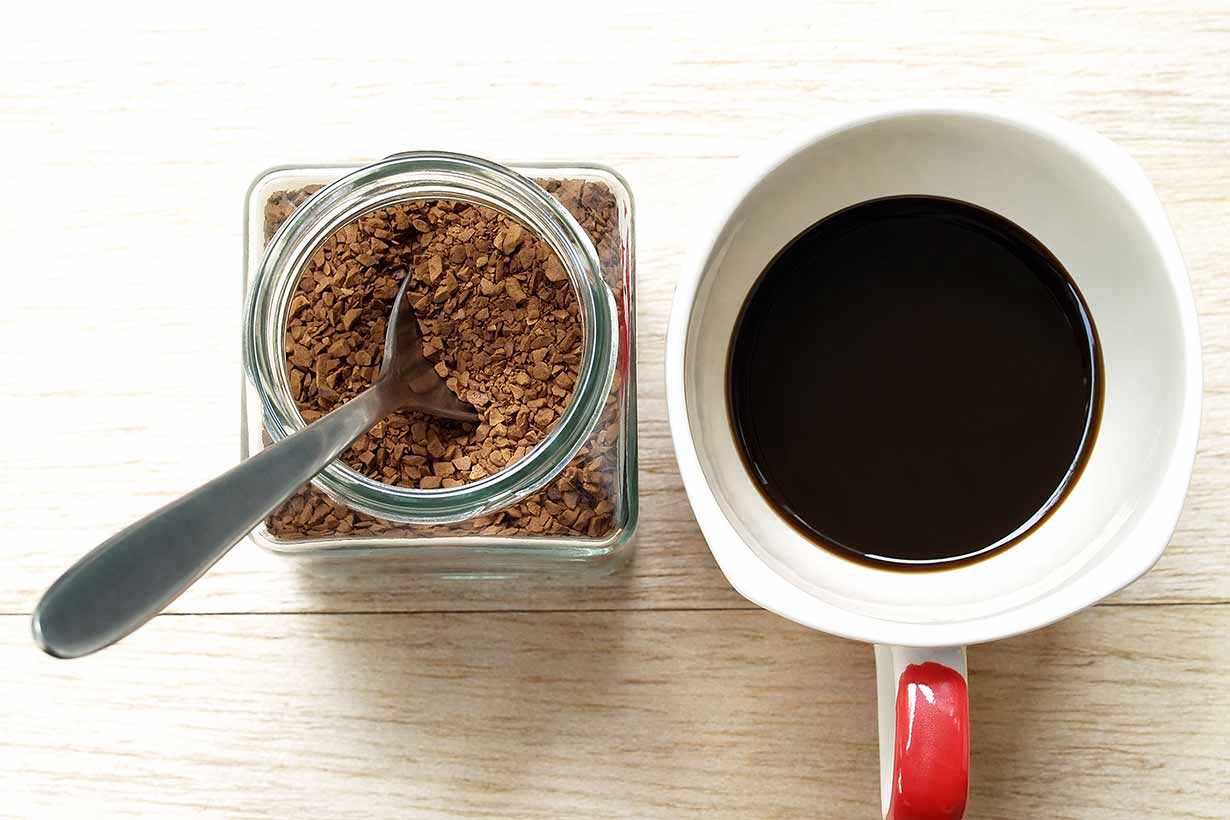Chlorogenic acid is the primary polyphenol in coffee, and research links it to several potential health benefits.
In fact, much of the research on this compound is the reason why many people view coffee as a healthy drink.
The purported benefits of chlorogenic acid include better glucose and insulin regulation, decreased blood pressure, and improved cardiovascular function.
For an accurate look at the compound, this article looks at the most recent research from human studies.
Can it really benefit our health?
What is Chlorogenic Acid?
There is a wide range of naturally occurring acids in a cup of coffee, but among these, chlorogenic acid is the most prevalent.
In fact, many different plants contain the compound, but coffee provides substantially higher concentrations than any other food source.
In terms of structure, chlorogenic acid is an ester of caffeic acid and the 3-hydroxyl position of L-quinic acid (1).
Chlorogenic acid is thought to strongly influence how coffee tastes, and it is responsible for much of the bitter/astringent flavor (2).
As previously mentioned, there are a lot of health claims surrounding chlorogenic acid, covering everything from weight loss to cardiovascular protection.
Let’s now take a look at the health claims in more detail, and see what the research says.
Note: some of the studies on chlorogenic acid use a supplement called green coffee bean extract. However, studies show that regular coffee drinkers can consume more than 1 gram of chlorogenic acid daily, which is more than enough (3).
In other words, it’s possible to get the same amount from regular coffee – no expensive supplements are necessary!
1. Chlorogenic Acid Appears To Reduce Blood Pressure
There have been numerous studies investigating the link between chlorogenic acid and blood pressure;

- A randomized, controlled trial demonstrated that 140 mg per day of chlorogenic acid could decrease blood pressure. In this study, all participants who took chlorogenic acid had “significantly reduced” blood pressure readings shortly after ingestion compared to placebo (4).
- In another randomized study, participants were asked to consume no coffee, 40 grams of green coffee per day, and 40 grams of black coffee. Regularly drinking black and green coffee decreased both systolic and diastolic blood pressure readings compared to no coffee. The difference was small for black coffee drinkers, but “significant” for green coffee drinkers. The researchers hypothesize that the difference is due to the higher concentrations of chlorogenic acid in green coffee (5).
- A systematic review of randomized trials concludes that the available evidence suggests chlorogenic acid intake causes a statistically significant, moderate reduction in systolic and diastolic blood pressure (6)
This is an interesting finding since coffee’s effect on blood pressure is often debated.
2. Chlorogenic Acid May Improve Glucose Regulation
Another proposed benefit of chlorogenic acid is improved glycemic control.
Here is an overview of some human studies (and one in mice);
- In a randomized crossover trial, 1 gram of chlorogenic acid significantly reduced glucose (<0.7 mmol/L) and insulin (-73 pmol/L) levels 15 minutes following an oral glucose tolerance test (7).
- A randomized, controlled, double-blind study tested oral chlorogenic acid versus placebo in patients with impaired glucose tolerance. The participants either consumed 400 mg of chlorogenic acid three times per day or a placebo. After a 12-week intervention period, the patients taking chlorogenic acid had decreased fasting blood glucose, lower insulin secretion rates, and an improved lipid (cholesterol) profile (8).
- Long-term administration of chlorogenic acid, using an approximate equivalent to 1 gram per day (as seen in regular coffee drinkers), improves glucose and lipid metabolism, as well as diabetes-related complications in diabetic mice (9).
When combined with the wealth of observational studies on coffee drinkers, these randomized clinical trials show that chlorogenic acid can beneficially affect glucose and insulin levels.
As a result, chlorogenic acid may play a role in improving glycemic control.
3. May Protect Against Heart Disease and Atherosclerosis
Atherosclerosis (the buildup of arterial plaque) is an epidemic and the biggest killer in the modern world.

Importantly, our overall lifestyle can either positively or negatively affect the risk factors involved in developing the disease.
On this note, some observational studies suggest coffee may be cardioprotective.
For instance, there is an inverse association between coffee and cardiovascular mortality, and researchers have hypothesized that this may be due to coffee’s chlorogenic acid content (10, 11).
However, as always, we cannot imply causation from an association, so let’s look at some controlled studies.
Studies on Chlorogenic Acid and Cardiovascular Health
- A randomized, controlled study in human volunteers showed that drinking coffee high in chlorogenic acid (non-dark roasts) improved postprandial blood flow and endothelial function. This effect was observed in a single (one cup) intake of coffee (12).
- Placebo-controlled, randomized human trials show that chlorogenic acid intake equivalent to 2 cups of coffee results in “significantly higher” plasma chlorogenic acid, meaning that the compound is well absorbed. They also show that there is a significant reduction in blood pressure (13).
- In a study on insulin-resistant mice with hyperlipidemia (excessive cholesterol levels), intravenous chlorogenic acid administration resulted in vastly reduced cholesterol (<44%) and triglyceride (<55%) levels. Of course, humans are not mice, and we certainly don’t consume chlorogenic intravenously. However, this provides more evidence that chlorogenic acid can exert substantial effects in the body (14).
- In a rodent study, chlorogenic acid was shown to promote cholesterol efflux as well as significantly reduce the development of atherosclerotic plaque (15).
4. Chlorogenic Acid Improves Endothelial Function in Human Studies
Endothelial function refers to the physical state of the endothelium, the inner lining of all the blood vessels within our body.
The proper functioning of these cells is critical, and endothelial dysfunction – the result of acute inflammation – can lead to cell damage. Sustained inflammation and consequent endothelial cell damage leads to the development of atherosclerosis (arterial plaque) (16, 17).
Our diet, habits, and overall lifestyle can play a role in keeping our endothelium healthy.
One of the best ways to check endothelial function is by taking flow-mediated dilation (FMD) readings. FMD refers to the dilation of our arteries/blood vessels during increased blood flow.
Studies on Endothelial Function
- A controlled human trial found that neither 450 mg nor 900 mg doses of chlorogenic acid had a significant effect on FMD. However, there were statistically significant dose-related improvements to the mean continuous flow, especially 1 hour after ingestion (18).
- Two randomized trials compared two coffee drinks matched in caffeine content. One coffee was rich in chlorogenic acid, while the other contained low amounts. The results demonstrated that higher doses of chlorogenic acid improve FMD response. Notably, after coffee intake, the improvement in FMD response took place at the same time as plasma chlorogenic acid metabolites appeared (19).
- A further randomized, controlled clinical trial shows that chlorogenic-acid rich coffee significantly improves FMD at 1 and 2 hours post coffee intake (20).
5. Anti-Inflammatory Activity
There are claims that chlorogenic acid displays anti-inflammatory and antioxidant properties (21, 22).

However, almost all studies on polyphenols and antioxidant activity take place in a test tube.
This fact is crucial because it is unlikely that there are high enough concentrations of plasma chlorogenic acid to have the same direct effect on the body.
However, research suggests that while polyphenols don’t act directly as antioxidants, they may impact upon various processes in the body.
In their own words, researchers Ashimina Kerimi and Gary Williamson explain;
“Although the direct action of polyphenols in vivo as purely chemical antioxidants is mostly discredited, many of the proposed mechanisms in vivo are related to oxidative processes, involved in cell signaling, inflammation, insulin resistance, glucose and lipid metabolism, mitochondrial function and superoxide production” (23).
Studies in Human Participants
As mentioned, most studies on chlorogenic acid and inflammation use cultured cells in test tubes.
These do not give an accurate representation of mechanisms within the body, but there is one study that was done on human participants.
This particular study was randomized and controlled, and it looked at the impact of high chlorogenic acid coffee on post-exercise inflammation and oxidative stress.
However, no significant differences in inflammation were noted between chlorogenic acid and placebo (24).
6. Weight Loss
Chlorogenic acid is the main active ingredient in green coffee bean extract supplements.
There is a common claim that the compound has anti-obesity effects and can lead to weight loss.
As discussed earlier, chlorogenic acid appears to increase the uptake of glucose, which could be an explanation for a potential weight loss effect.
But what do the studies say?
Systematic Reviews
Two systematic reviews have examined the potential weight loss effects from green coffee bean extract;
- The first systematic review examined three relevant randomized, controlled trials. This particular meta-analysis found that green coffee bean extract can promote weight loss, but that the weight loss effect is only slight. The sample size of studies is also minimal (25).
- A second, more recent review analyzed five clinical trials and the prior meta-analysis. The findings were positive, with the study noting that there are clinically significant weight loss results from consuming chlorogenic doses between 81 mg and 400 mg. However, all of the studies featured had limitations – primarily related to their small sample size (26).
As can be seen, it appears that chlorogenic acid may slightly assist in weight loss efforts, but the potential effects shouldn’t be exaggerated.
For optimal weight loss and overall health, diet and lifestyle always come first.
How Much Chlorogenic Acid is in Coffee?
The amount of chlorogenic acid in coffee significantly varies depending on the roasting time.
For example, 104 samples of espresso coffee from cafes in Scotland, Italy, and Spain found that the chlorogenic acid content varied from 6 mg to 188 mg per serving (3).
With such a substantial variation, here’s a breakdown of the chlorogenic acid content in espresso by country;
- Italy: 20 – 81 mg
- Scotland: 6 – 157 mg
- Spain: 92 – 188 mg
As this data shows, Spanish coffee contains far higher amounts of chlorogenic acid than Italian coffee.
Significantly, this is because Spanish coffee shops tend to utilize lightly roasted coffee beans. On the other hand, Italians enjoy longer dark roasts of coffee.
For higher concentrations of chlorogenic acid, we should opt for lighter coffee roasts, since the compound breaks down during the roasting process (27).
In other words, green coffee beans are the most concentrated, followed by light roast, medium roast, and lastly dark roast coffee.
Instant coffee will also contain varying amounts dependent upon the processing.
Please note: On the topic of the polyphenol content of coffee, some research suggests that interactions with milk may decrease the absorption of coffee phenols.
Please see this guide to Caffe Latte for more information: Is Caffe Latte Healthy? Nutrition, Benefits, and Drawbacks
Final Thoughts
There are a lot of health claims about coffee and its most prominent chemical compound, chlorogenic acid.
A lot of the research in this area is mixed.
Firstly, human studies demonstrate promising results on glycemic control, blood pressure, and endothelial function.
Conversely, there is insubstantial evidence to support chlorogenic acid having anti-inflammatory or (significant) weight loss effects.
That said, coffee is reasonably healthy and it tastes delicious, so it’s probably better to enjoy the drink and think of any health benefits as a bonus.
Related Articles









In other words, Green coffee can not effectively reduce weight problems as advertised?
It may have a very slight effect, but it certainly wouldn’t be anything notable. Weight loss is more about overall lifestyle – particularly diet and sleep.